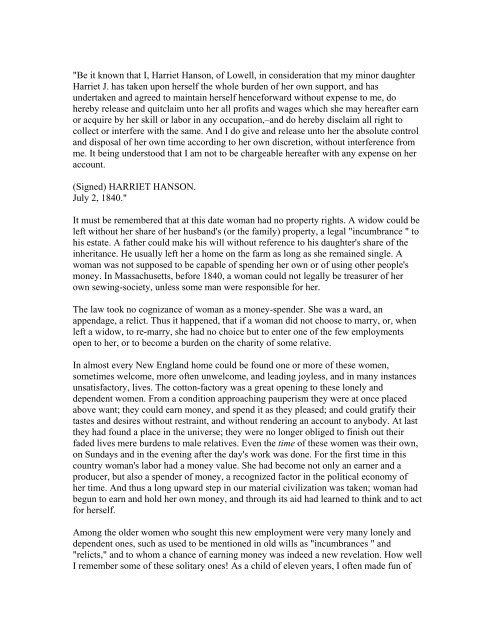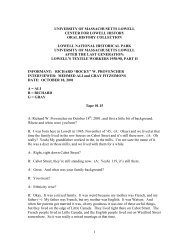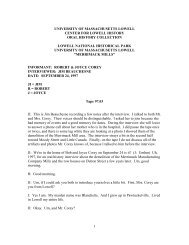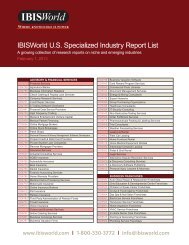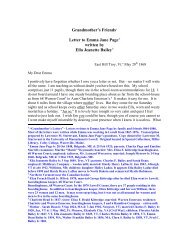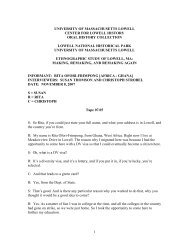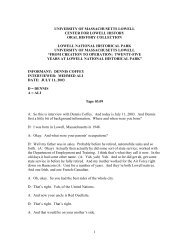LOOM AND SPINDLE OR Life Among the Early Mill Girls WITH A ...
LOOM AND SPINDLE OR Life Among the Early Mill Girls WITH A ...
LOOM AND SPINDLE OR Life Among the Early Mill Girls WITH A ...
You also want an ePaper? Increase the reach of your titles
YUMPU automatically turns print PDFs into web optimized ePapers that Google loves.
"Be it known that I, Harriet Hanson, of Lowell, in consideration that my minor daughter<br />
Harriet J. has taken upon herself <strong>the</strong> whole burden of her own support, and has<br />
undertaken and agreed to maintain herself henceforward without expense to me, do<br />
hereby release and quitclaim unto her all profits and wages which she may hereafter earn<br />
or acquire by her skill or labor in any occupation,–and do hereby disclaim all right to<br />
collect or interfere with <strong>the</strong> same. And I do give and release unto her <strong>the</strong> absolute control<br />
and disposal of her own time according to her own discretion, without interference from<br />
me. It being understood that I am not to be chargeable hereafter with any expense on her<br />
account.<br />
(Signed) HARRIET HANSON.<br />
July 2, 1840."<br />
It must be remembered that at this date woman had no property rights. A widow could be<br />
left without her share of her husband's (or <strong>the</strong> family) property, a legal "incumbrance " to<br />
his estate. A fa<strong>the</strong>r could make his will without reference to his daughter's share of <strong>the</strong><br />
inheritance. He usually left her a home on <strong>the</strong> farm as long as she remained single. A<br />
woman was not supposed to be capable of spending her own or of using o<strong>the</strong>r people's<br />
money. In Massachusetts, before 1840, a woman could not legally be treasurer of her<br />
own sewing-society, unless some man were responsible for her.<br />
The law took no cognizance of woman as a money-spender. She was a ward, an<br />
appendage, a relict. Thus it happened, that if a woman did not choose to marry, or, when<br />
left a widow, to re-marry, she had no choice but to enter one of <strong>the</strong> few employments<br />
open to her, or to become a burden on <strong>the</strong> charity of some relative.<br />
In almost every New England home could be found one or more of <strong>the</strong>se women,<br />
sometimes welcome, more often unwelcome, and leading joyless, and in many instances<br />
unsatisfactory, lives. The cotton-factory was a great opening to <strong>the</strong>se lonely and<br />
dependent women. From a condition approaching pauperism <strong>the</strong>y were at once placed<br />
above want; <strong>the</strong>y could earn money, and spend it as <strong>the</strong>y pleased; and could gratify <strong>the</strong>ir<br />
tastes and desires without restraint, and without rendering an account to anybody. At last<br />
<strong>the</strong>y had found a place in <strong>the</strong> universe; <strong>the</strong>y were no longer obliged to finish out <strong>the</strong>ir<br />
faded lives mere burdens to male relatives. Even <strong>the</strong> time of <strong>the</strong>se women was <strong>the</strong>ir own,<br />
on Sundays and in <strong>the</strong> evening after <strong>the</strong> day's work was done. For <strong>the</strong> first time in this<br />
country woman's labor had a money value. She had become not only an earner and a<br />
producer, but also a spender of money, a recognized factor in <strong>the</strong> political economy of<br />
her time. And thus a long upward step in our material civilization was taken; woman had<br />
begun to earn and hold her own money, and through its aid had learned to think and to act<br />
for herself.<br />
<strong>Among</strong> <strong>the</strong> older women who sought this new employment were very many lonely and<br />
dependent ones, such as used to be mentioned in old wills as "incumbrances " and<br />
"relicts," and to whom a chance of earning money was indeed a new revelation. How well<br />
I remember some of <strong>the</strong>se solitary ones! As a child of eleven years, I often made fun of


